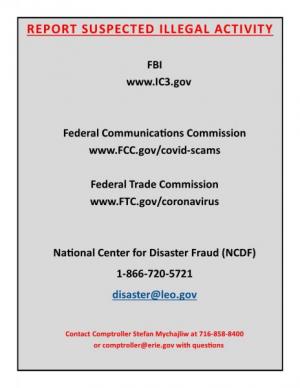Modified: March 25, 2020 8:11am
Created: March 25, 2020 7:38am
Scammers Selling Fraudulent Home Test Kits and Vaccine Kits, Targeting Vulnerable Citizens
(ERIE COUNTY, NY) – Coronavirus testing kits are in short supply for government agencies and medical professionals conducting the tests here at home and around the world. That has resulted in some unscrupulous scam artists preying on those fears by offering fake kits for sale. That is why Erie County Comptroller Stefan I. Mychajliw Jr., serving in his capacity as the “Taxpayer’s Watchdog,” is calling on consumers to not fall victim to those trying to rip off people by selling Coronavirus test kits.
“It’s horrendous what scam artists will do and how far they will go to prey on vulnerable people. Buyer beware, especially of people trying to sell a home Coronavirus test kit. People need to be warned of these scams so that they don’t fall victim. There are no approved testing kits available for public purchase. Anyone that tries to sell you one is trying to rip you off,” said Comptroller Mychajliw.
 While Erie County has struggled to get enough testing kits to meet demand compared to other counties in New York State, people should know the fact that THERE ARE NO legitimate coronavirus test kits available to the general public for purchase. Testing is still limited to the labs, government entities, and medical professionals overseeing the handling of this pandemic. Scam artists are also looking to capitalize on the fact more people are staying at home.
While Erie County has struggled to get enough testing kits to meet demand compared to other counties in New York State, people should know the fact that THERE ARE NO legitimate coronavirus test kits available to the general public for purchase. Testing is still limited to the labs, government entities, and medical professionals overseeing the handling of this pandemic. Scam artists are also looking to capitalize on the fact more people are staying at home.
“I wholeheartedly understand how frightened people are. They are scared. These are trying times. People yearn to feel safe. One way they think they can calm fears is to know with 100% certainty whether or not they test positive for the Coronavirus. At this time, the only way to do that is through medical professionals, whether it be the Erie County Health Department, your physician or in a hospital. If you see a Coronavirus home test kit on Amazon, don’t buy it. It’s junk. Garbage. Save your money,” added Comptroller Mychajliw.
While the government is working with private industry to speed up production of testing kits, those kits will be provided to the same agencies and health care professionals overseeing the handling of this pandemic.
Comptroller Mychajliw is advising the public that purported vaccine kits available for sale are also fraudulent. According to the United States Department of Justice, “there are currently no legitimate COVID-19 vaccines and the World Health Organization is not distributing any…” Any website or phone call that claims it can provide you with a vaccine kit is not real.
“It’s appalling,” added Mychajliw. “Be on heightened alert. While you take every necessary precaution to avoid getting COVID-19, you must also take steps to ensure you’re not the next victim of fraud.”
Earlier this week the Justice Department announced that it had obtained a temporary restraining order against a website that claimed to have vaccine kits.
Some fraudulent sites or phone calls include:
- Calls or Phishing emails claiming to be “Worldwide Health Organization,” mimicking World Health Organization or Centers for Disease Control and Prevention
- CoronavirusMedicalKit.com
- Malicious websites and apps with Coronavirus information that seek payment
- Medical providers obtaining patient information for COVID-19 testing, then using that information to fraudulently bill for other tests and procedures
- Callers claiming to be Medicaid/Medicare representatives offering free COVID-19 tests, and you pay for shipping.
In addition, Amazon says it has blocked or removed more than one million products from its marketplace where false claims were made about products to help combat coronavirus.
You can report suspected illegal activity to:
- The FBI at IC3.gov
- The Federal Communications Commission at FCC.gov/covid-scams
- The Federal Trade Commission at FTC.gov/coronavirus
- National Center for Disaster Fraud (NCDF) at 1-866-720-5721 or email: disaster@leo.gov
Comptroller Mychajliw says be sure you don’t provide personal information or send money to websites or callers making claims about coronavirus test kits or cures.
“These are incredibly challenging times. If we remain vigilant, do what health care providers tell us to do, and take every step to make sure we don’t fall for a scam we will get through this together,” concluded Comptroller Mychajliw.






